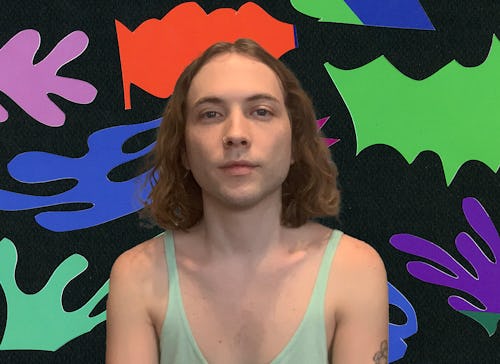Devlyn Camp is the queer history teacher we need right now
The Queer Serial podcaster tells stories of LGBTQ+ liberation that give me hope for the future.

My queer future feels particularly precarious right now. It feels like the hard won rights earned by queer activists over the course of a century could disappear at any moment. Honestly, it feels terrifying. In my quest to find hope that a queer future is even possible, I decided to delve into our collective history. Devlyn Camp’s Queer Serial podcast became my primary text, so I talked to Camp about how educating ourselves on the queer liberation movements of the past might inform and inspire our movement toward the future.
I’ve never been much of a history buff. Honestly, I find the subject kind of intimidating; there’s just so much I don’t know. But Camp’s titillating style of storytelling hooked me on Queer Serial almost immediately. “Many people to tend to write off historic nonfiction as a pile of dusty old books, but queer folks in history have some of the juiciest, most fun, and surprising stories to tell,” the 30-year-old writer and podcast producer tells me. “We just aren't very aware of that because our history hasn't been taught to us in school.” Yes. This.
In a way, Camp is becoming the queer history teacher I never had, and it turns out they started the podcast for many of the same reasons I looked for it. Around the time of the 2016 presidential election, Camp was researching the Mattachine Society, a gay rights organization founded in secrecy in 1950. “It was a pretty cathartic experience making the first three seasons of Queer Serial during the Trump presidency, when it became clear to many of us that our rights could be rolled back pretty quickly,” they say.
“Even in far darker days for queer folks, like the 1950s, our community couldn't be completely silenced. No matter how dark things get, we're not going anywhere.”
It seems that Camp, too, was seeking hope and inspiration. And they found it. “There are countless stories — pickets, and riots, and sit-ins, and all kinds of courageous acts — that give me hope about the queer future,” Camp says. “Even in far darker days for queer folks, like the 1950s, our community couldn't be completely silenced. No matter how dark things get, we're not going anywhere.” Amen.
Queer Serial follows both prominent and lesser known queer liberation activists through the struggle, starting with the early 20th Century. But Camp isn’t just recapping queer history through the podcast; they’re also queering history by telling it in all its dramatic — and sometimes NSFW — glory. “It's like a soapy radio show with fabulous drama and shocking cliffhangers, except it's all true queer history,” Camp says.
Queer Serial isn’t just handing us hope by telling us about our past, either; it’s actively making our future in the process. The show’s resilience, creativity, and popularity through the past few years is a reminder that we can thrive by digging into our roots. Camp is about to release a sort of spin-off “sister series” called “Give 'Em Hell, Harry! Keeping Harvey Milk’s Dream Alive;” and they’re also directing a documentary about the last active Mattachine activist, Randy Wicker. If one curious queer can create all of this, we really do have a future.
Camp has a lot of beautiful stories to share, as well as important insight about how we can find solidarity with one another across liberation movements. “I hope that anyone seeking out queer history — whether it's in books, movies, podcasts, whatever — don't just gravitate toward people who look like them,” Camp says. “It's nice to see yourself in a story. It's also nice to see someone completely different. We all have things to teach each other.”
The reality is that, like other histories, the voices and contributions of Black and Brown people, trans people, and other marginalized folks within the queer community have often been ignored — and Camp is trying to find ways to reintegrate those voices. “I find that, when I'm researching a story for the podcast, if the story is largely male or largely white, I look around at other organizations or class groups to see what other queer people were doing at the same time,” Camp says.
“It's like a soapy radio show with fabulous drama and shocking cliffhangers, except it's all true queer history.”
As an example, they point to an episode from Season 2 of Queer Serial: When the ‘Hose and Heels Club’ of upper class white trans women were secretly meeting in L.A. hotel rooms to ‘cross-dress,’ there were trans girls of color down at Cooper Do-nuts rioting against the cops in Skid Row,” Camp says. “Telling both stories side-by-side gives better context to both groups of people.” In other words, it’s not possible to repair the fractures of the past — but perhaps resuscitating the stories of previously unrecognized folks can help us understand how both the histories and futures of all queer people are now, always have been, and will continue to be completely intertwined.
Camp hopes that understanding the work of our queer activist ancestors — both the missteps and progressions — will help us create a more beautiful future. But, they emphasize, we must do the hard work of learning. “As creators and consumers of content, we all need to be doing our homework — because obviously our public schools aren't teaching us everything,” they say. Thriving queer history projects like Camp’s make doing my homework a pleasure and remind me that — even in the scariest moments — we will not be erased.